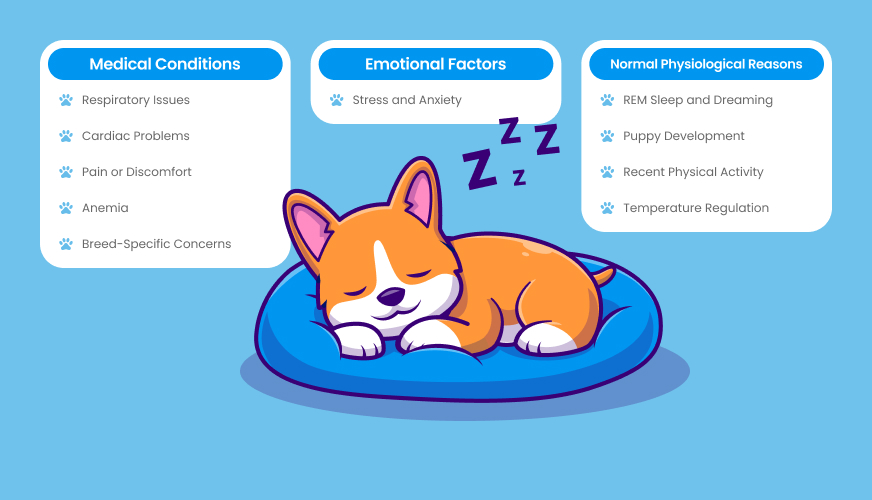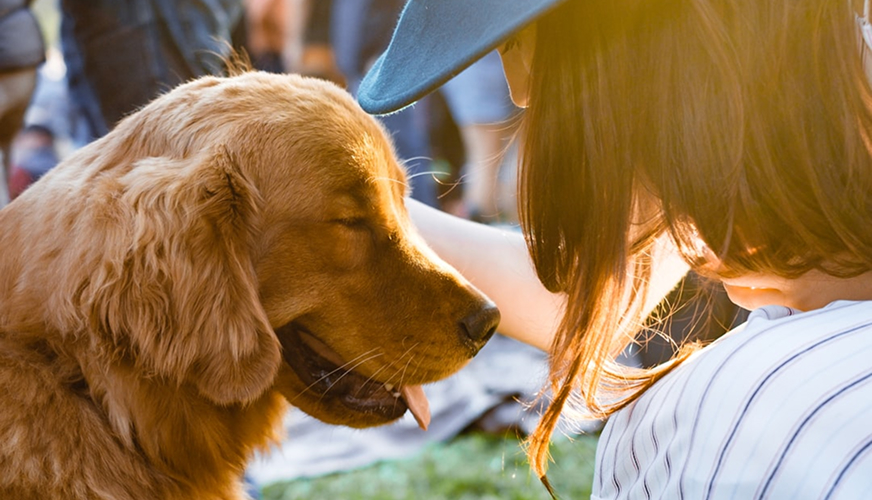Why Is My Dog Breathing Fast While Sleeping?
Have you ever glanced over at your pup, peacefully snoozing, only to notice their chest rising and falling a little too quickly? It’s natural to feel a bit alarmed and wonder, “Why is my dog breathing so fast while sleeping?” or even “Is this normal?”
You’re not alone, many pet parents search for answers about dog breathing fast while sleeping, and the good news is that in most cases, it’s nothing to worry about. But it’s also smart to understand when this fast breathing is simply a sign of sweet dreams, and when it could point to something more serious.
In this blog, we’ll uncover the meaning of dog sleeping positions and breathing patterns, dive into what’s considered normal, and help you feel more confident about what your furry friend is experiencing during rest.
Understanding Normal Breathing in Dogs
Before we jump to conclusions, let’s talk about what “normal” really looks like. A healthy dog’s resting respiratory rate typically ranges between 10 to 35 breaths per minute. Puppies and smaller breeds tend to breathe a little faster, while larger breeds might be on the lower end of that scale. Age and activity level also play a huge role—your senior Golden Retriever won’t breathe quite the same as your energetic Chihuahua puppy.
How to Check Your Dog’s Breathing Rate at Home:
It’s easy and only takes a minute. While your dog is calm or asleep, count how many times their chest rises in 30 seconds, then double that number to get their breaths per minute. If the number consistently seems higher than normal, especially while sleeping, it might be time to pay attention.
Factors like recent play, stress, room temperature, or even dreams can all affect your dog’s breathing while sleeping. That’s why it’s important to know the difference between normal fast breathing and signs of an underlying issue.
Let’s dig a little deeper into what could be going on…
Read More: The Link Between Sleep & a Happy, Healthy Pet
Common Causes of Dog Breathing Fast While Sleeping
If you’ve ever watched your dog breathe fast while sleeping, you’re not alone. Many pet parents notice it and wonder, “Is this normal, or should I be worried?” The good news is, in many cases, it’s completely natural. But sometimes, it may point to something more serious. Let’s break it down together.
a. Normal Physiological Reasons
➤ REM Sleep and Dreaming
Just like humans, dogs go through different stages of sleep, including REM (Rapid Eye Movement) sleep. This is when dreaming happens—and yes, your dog dreams too! During this phase, it’s totally normal to see twitching paws, soft whimpers, tail movements, and yes, fast breathing. This kind of dog breathing fast while sleeping is harmless and usually short-lived.
➤ Puppy Development
Puppies are little energy balls, and their bodies are growing at a rapid pace. They tend to have faster breathing rates, even while they’re snoozing. So, if your puppy is breathing fast while sleeping, it’s usually just their body working overtime to grow and develop.
➤ Recent Physical Activity
If your dog has just enjoyed a walk or a good play session, they might breathe faster for a bit while resting. Even in sleep, their body may still be recovering. This fast breathing during sleep should settle down as their heart rate returns to normal.
➤ Temperature Regulation
Dogs don’t sweat like humans. Instead, they pant to cool down. If your pup is snoozing in a warm room or after a hot day, fast breathing while sleeping can simply be a sign they’re trying to regulate their body temperature.
b. Emotional Factors
➤ Stress and Anxiety
Yes, dogs feel stress too. Emotional triggers like loud noises, changes in environment, or separation anxiety can lead to irregular or rapid breathing while they sleep. A dog that’s unsettled might breathe faster even when they’re seemingly relaxed.
c. Medical Conditions
While most cases of dogs breathing fast while sleeping are benign, some could signal underlying health issues. Here’s what to look out for:
➤ Respiratory Issues
Conditions like asthma, kennel cough, or lung infections can cause labored or fast breathing. If your dog is breathing heavily while sleeping and it’s persistent, a vet check is essential.
➤ Cardiac Problems
Heart disease can reduce oxygen flow, causing your dog to breathe quickly to compensate—even at rest. Especially if you notice fatigue, coughing, or blue-tinged gums alongside fast breathing, it’s time to consult your vet.
➤ Pain or Discomfort
Injuries, bloating, or internal discomfort may cause your dog to breathe faster than normal while resting. They can’t always show pain clearly, so changes in breathing are sometimes one of the few signs we get.
➤ Anaemia
If your dog isn’t getting enough oxygen due to a low red blood cell count, their breathing may increase. This condition requires diagnosis and treatment by a vet.
➤ Breed-Specific Concerns
Short-nosed breeds like Bulldogs, Pugs, and Shih Tzus (called brachycephalic breeds) often have breathing challenges. Their anatomy can lead to fast breathing during sleep, and while it might be normal for them, it’s always good to monitor for signs of distress.
Understanding the meaning of your dog’s sleeping position and breathing pattern helps you become a more attentive and informed pet parent. While fast breathing during sleep is often harmless, keeping an eye on patterns and knowing when to get help makes all the difference.
Read More: How Anxiety Affects Your Pet’s Sleep & Ways to Comfort Them
When to Be Concerned
It’s completely natural to feel worried if you notice your dog breathing fast while sleeping, especially if it seems unusual or happens frequently. While rapid breathing can be normal during dream-filled REM sleep, there are times when it could signal something more serious.
Start by paying attention to the context. If your pup is sleeping in a cool, quiet space and hasn’t just finished playing or exercising, yet is still breathing rapidly, it’s worth taking a closer look.
Here are some signs that may indicate a health issue:
- Persistent fast breathing even when your dog is resting in a calm environment.
- Labored or open-mouth breathing, especially during sleep or while lying down.
- Blue or pale gums, which can point to a lack of oxygen and poor circulation.
- Lethargy or reluctance to move, even during usual playtime or walks.
- Unusual breathing sounds like wheezing, whistling, or coughing during sleep or rest.
These symptoms can be connected to issues such as respiratory infections, heart conditions, or even pain and discomfort that’s not immediately visible. While not every instance of dog fast breathing while sleeping is an emergency, ignoring consistent patterns can lead to bigger problems down the line.
It’s a good idea to start tracking your dog’s breathing—note how often it happens, what time of day, and any other changes in behavior. This kind of information is incredibly valuable for your vet, helping them get a clearer picture of what’s going on.
When in doubt, always trust your gut. If your furry companion just doesn’t seem like themselves, don’t wait, consult your veterinarian and share your observations. After all, no one knows your dog better than you do.
Steps to Take if You’re Concerned
If you’ve noticed your dog breathing fast while sleeping and it doesn’t seem linked to playtime, warm temperatures, or dreaming, it’s natural to feel a little worried. But don’t panic—here’s what you can do to get clarity and help your furry friend feel their best.
1. Observe and Record
Start by gently observing your dog during their sleep. Count their breaths for a full minute—anything consistently over 35 breaths per minute while resting could be considered rapid. Note any other signs like twitching, whining, or restless movement.
2. Check the Environment
Sometimes, fast breathing is simply your dog’s way of cooling down. Make sure they’re not sleeping in a warm or stuffy spot. Try adjusting the room temperature or moving their bed to a cooler, more ventilated area.
3. Consider Recent Activity
Was your pup running around or playing fetch just before they crashed? If so, faster breathing may just mean they’re recovering. Let them rest and check in again in a few minutes.
4. Look for Other Symptoms
Rapid breathing on its own isn’t always alarming, but if it’s paired with signs like pale gums, lethargy, coughing, or open-mouth breathing, it’s time to contact your vet. These could point to respiratory issues, anxiety, or heart problems.
5. Invest in Their Comfort
Sometimes, a dog breathing fast while sleeping could be reacting to discomfort or lack of support—especially in senior dogs or those with arthritis. An orthopaedic dog bed can make a huge difference by easing pressure on joints and promoting deeper, more restful sleep.
Conclusion
So, is it normal for your dog to breathe fast while sleeping? Sometimes, yes, especially if they’re dreaming, growing, or cooling down. But if it happens frequently or seems out of the ordinary, it’s always better to play it safe and check in with your vet. Remember, every dog is different, and you know your pup best.
And if comfort is a concern, upgrading to a high-quality orthopaedic dog bed, like the kind we offer at ComfyTails, could be a game-changer. Our beds are designed to support restful sleep, reduce discomfort, and help pets (especially senior ones) sleep easy. Because a well-rested dog is a happy, healthy one.








